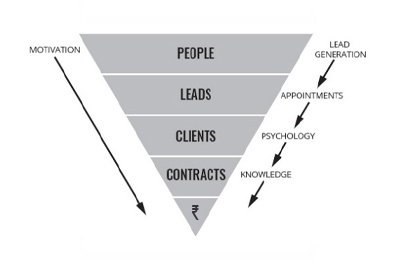The Real Estate Sales Funnel And How It Works
The success of real estate brokers like us is solely our own responsibility. The same isn’t true for many other jobs. You won’t be given instructions by a manager, boss, or supervisor. There won’t be set office hours for you dictated by another person. You won’t be aware of when the clock is running, and if you are not. Never will you be “at work,” yet never will you not be.”
The majority of jobs in the market have distinct lanes that you must learn to navigate.
Similar to swimming pool lanes, there is just one way to move forward, and the only factor to consider is your speed.
In this business though – It’s more like being dropped in the middle of the ocean to be a real estate agent. Nobody can direct your swimming or tell you where to go, so you can swim however you like. You have total flexibility and there aren’t many guidelines or limitations, which is precisely why the majority of real estate agents flounder in the business.
All Things Are Funnels
Like every other business, real estate sales have a funnel. Brandon Turner, the host of The BiggerPockets Podcast and best-selling author, deserves credit for bringing this up. You begin with a sizable number of prospective leads. Then, after careful consideration, work, and qualifying, you arrive at the other end with a much smaller group of highly qualified applicants.
The funnel process is the method by which we move from a huge pool of possible applicants to a much smaller pool of more valuable candidates.
The finest business owners in general, including agents, excel at two things:
- Filling the top of their funnel with a lot of folks.
- Moving those individuals from one funnel level to the next.
Let’s examine how this procedure functions in other companies and organizations to provide context. Here are some instances of how to use funnels to make money and get results.
- A vast quantity of raw fossil fuel is transformed into a smaller quantity of usable gasoline at an oil refinery.
- A sports team will bring in a lot of athletes for tryouts before progressively eliminating all but the best.
- To sift out the people who are the least qualified, a corporation posts job openings to a big number of candidates.
- Real Estate consultants like us has a vast database of people they’ve met, and they go from being just names to leads to clients to sales by following a set process.
The purpose of writing this blog article is to improve your understanding of how we guide our esteemed clients through our sales funnel.
Stage of A Sales Funnel
The five steps of the real estate sales funnel are people, leads, clients, contracts, and closings. One must master the tools necessary to advance clients to the following level in order to move them successfully down the funnel’s stages. You are paid when a customer drops out. You receive nothing if a customer doesn’t go all the way down.
The five steps appear as follows when arranged like a funnel:
Stage 1: Individuals
At the top of our funnel, we’ll start by looking for individuals whom we can convert into leads. Since this is the first stage of the funnel, you will discover that you spend most of your time here, especially if you are just starting out in business.
People are practically everywhere during real estate sales, which is one of the finest aspects of this business. You need only go outdoors to locate them. Dislike taking a stroll outside? Call someone as soon as possible. Do not feel like speaking right now? Send mail via email. You don’t want to email just one person, do you? Organize a marketing campaign online. Being too lazy to accomplish that? Post current hobbies on social media to see who responds. There are people all over.
You simply have to use your imagination to find and establish connections with potential clients.
Stage 2: Leads
A lead is a potential customer or seller who is aware of your existence.
The main goal of top performing real estate agents is to continuously target leads. If you’re in sales, you have two jobs. The first is your profession of choice; the second is lead generation. The most crucial thing an agent can do is find leads.
You might believe that finding individuals is our top priority because they are higher on the funnel than leads. After all, that is the actual funnel’s top. However, unless someone is driven to buy or sell a house, they won’t freely travel down the sales funnel. It is thus advisable to start looking for leads in the “people” area because motivation is necessary to move someone down the funnel.
Stage 3: Clients
The majority of rookie real estate agents see their usual workday in the client stage. You will be researching houses on property web portals during this time, submitting offers, touring residences, and conducting CMAs (Comparative Market Analysis). When you reach the client stage, you have gained the right to carry out the duties of an agent (representing customers, assisting them in making decisions, and fulfilling their dreams). Additionally, this is the point at which customers have earned your undivided attention.
An exclusive agent-buyer contract or exclusive listing agreement between a client and an agent is a legal contract. A “person” or “lead” cannot demand your complete attention until they have completed the necessary papers and converted into a client.
Stage 4: Contracts
After both parties have signed the offer contract, the duties of both parties are put into effect after escrow business is notified and escrow number is assigned. Both parties are now in “escrow” at this time. Running a successful real estate firm greatly depends on placing clients under contract and starting escrows. At this stage one can even replace the escrow process with a sizeable token amount with an MOU drafted and signed between the two parties stating that the token amount will have to be returned to the buyer by the seller if the legal due diligence process by the lawyers throws up conflicts in titles and other matters.
The escrow stage is the one where enlisting assistance from others is easier. Successful real estate agents frequently begin leveraging off the stages closest to the bottom of the funnel and work their way up from there. The majority of the labor that administrative assistants, transaction coordinators, and other comparable professionals accomplish occurs during the escrow phase. They are the entry-level assistance you will appoint to free up your time for greater time and money-making endeavors.
Stage 5: Closings
The funnel’s closure is the fifth and last stage. A closure is a successfully finished escrow in which the title is transferred and the agent is compensated for their services.
One simple fact is crucial to comprehend: You will not get compensated if a contract does not close. Period. No matter how well you did your work or how appreciative your clients are, it doesn’t matter. If you aren’t closing deals, you dont get paid. Its as simple as that!
Perhaps this is clear. We at Gupta & Sen, however, draw attention to this because doing so is better than failing to turn a lead into a client in the first place. It is worse to move a person to the last stage of the funnel only to have the contract fall through. Your time, effort, money, and resources will be better spent if you bring a deal all the way to escrow or depositing of token amount before losing the closure than if you lose a lead in stage two. The only exception to this rule is when an escrow doesn’t close but the client is retained and entered into a second contract.
Overview of Funnel tools
We can categorize prospects according to their position in the system using the stages of the sales funnel. After accurately identifying a sales prospect, you can concentrate on what the best course of action will be. The categories serve as way points that serve as a reminder of both where you are in the journey and, more importantly, where you are headed next.
The steps you must take to move customers through the sales funnel are known as the tools. Your efforts to become a top producer (top revenue generating real estate agent) will be mostly focused on creating these tools. Your efficiency will increase and your need to exert effort will decrease as your tools get sharper.
Top-producing agents have mastered these tools and can transfer prospects easily, effectively, and with a high conversion rate from one step to the next. If you are a real estate agent reading this then you must concentrate on increasing your effectiveness with these tools if you are serious about increasing your sales and creating a prosperous real estate agency. And one more thing.
The Three F’s should come first.
When new agents join our team, we at Gupta & Sen make them practice these various tools on the Three F’s:
- Family
- Friends
- Potential clients
Every agent should begin their lead generating with these three groups. These folks are most likely to be interested in helping you expand your company and achieve success. Additionally, they are also the most tolerant sales prospects. With people whom you already know and love, making errors or having unpleasant talks is much simpler. Utilizing these connections to advance your knowledge, self-assurance, and comfort level is always a safe bet.
We advise everyone in the real estate agency side of the business to practice using the tools on the Three Fs first before moving on. The best thing you can do to raise the number of deals you close and the amount of money you make is to become more proficient with whatever we have mentioned in this article!
Do not miss a single article!
Submit your email id to get new articles directly into your email inbox!
- Foreclosures REOs Probate Sales And More - October 10, 2022
- Treating Real Estate Investing As A Business - October 4, 2022
- Timeshare Condo Hotels and Other Investments - September 24, 2022




















